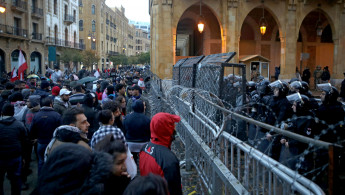Haaretz has 'no connection' to detained American reporter in Lebanon, as journalists demand his release
"No journalist was reporting for the newspaper on the protests from Beirut, and it has no connection to the US citizen being held," a statement on the publication's website said.
It added: "The live video feed on Haaretz's Facebook account was an official Reuters video feed. Haaretz did not receive that video directly from anyone other than Reuters."
An official statement from the Lebanese government accused Frakes of livestreaming for Haaretz, a claim he denies.The statement from Lebanon said Frakes had been handed over to army intelligence, which means he could potentially be detained for several days and subject to poor conditions.
When contacted by The New Arab, the Reuters office in London said in a phone call that the livestream of Lebanon was from Reuters Connect, a platform accessible by news publications across the world used to source videos, photos and texts for news stories.
Regarding Haaretz coverage specifically, it told The New Arab in an email: "Our live video streams are available to news organisations worldwide through Reuters Connect.
"Any questions about a specific outlet's coverage would need to be directed to that organisation." Frakes does not work for Reuters, and Haaretz does not have a reporter in Beirut.
Frakes has been handed over to military intelligence and could be subject to a military courts system where it is highly unlikely that he would be provided with legal representation, thereby denying him basic human rights.
The arrest comes as the situation in Lebanon deteriorates, with over 400 people wounded during anti-establishment protests and with armed soldiers taking to the streets of Beirut.
Frakes, a freelance journalist and an American citizen, had been covering the protests in Lebanon for media outlets, including The New Arab, when he was taken into custody by Lebanese police for questioning.
According to a source close to the situation, Frakes was in downtown Beirut taking photographs of the protests when he was detained, an area that has witnessed the heaviest injury toll for protesters since demonstrations erupted three months ago.
The Red Cross and Civil Defence have said that 377 people have been injured from police crackdown.
He had been "close to the frontlines, close to what was happening" when he vanished at approximately 8:30pm.
"He was arrested because apparently Haaretz had... a livestream [of the protests]," a source close to the situation told The New Arab. "They took [the videos] from Reuters and the police... decided [he was responsible]. Even though it wasn't him they decided it was."
The source said that she received a phone call at 3am, when she spoke to both the Lebanese police and Frakes.
"He is at the Ministry of Defence right now. He is being interrogated," she said.
Frakes was "at the wrong place, wrong time" and "he was just taking photos" not recording the scenes.
Frakes denied the accusations levelled against him, saying that he hadn't provided Israel-based news publication Haaretz with any material.
 |
| Frakes had been covering the protests |
Human rights abuses
Amnesty International has condemned the government after protesters said they were dragged from the street and tortured in secret detention set up by the military.
Protesters describe being subjected to a catalogue of abuse - including arrests without a warrant, severe beatings, insults and humiliation, blindfolding, and forced confessions.
Some were detained in unknown locations, denied access to lawyers or contact with their families, were prevented from accessing medical care, and had their phones searched.
Two former detainees told Amnesty they were subjected to mock executions. In seven of the cases documented by Amnesty, military forces, including military intelligence, conducted the arrests and the beatings.
All seven of these individuals were subsequently released following detention periods ranging from several hours to six days.
Since 14 January, "police officers have harassed, attacked, or detained journalists covering protests in Beirut", according to data compiled by the Committee to Protect Journalists.
Last week Greg Demarque, a French national and photographer for the Beirut-based Executive Magazine was detained and allegedly beaten up, and around the same time Hussein Beidoun, a photographer The New Arab's Arabic-language sister publication, was also briefly detained.
Violence escalates
Frakes' arrest comes as security forces in Lebanon are accused by human rights organisations of using excessive force against protesters.
A video shared online recently showed police allegedly beating protesters after they were brought to a Beirut police station.
Security forces opened an investigation into the claims, but no arrests have yet been made.
The American journalist's arrest marks a dangerous turn in the protest movement, with another sign that press freedom is being curtailed by authorities.
Security forces responded to clashes with protesters by using water cannons and tear gas and, as many witnesses will attest, to violence.
|
The protest movement that has rocked Lebanon since 17 October is demanding that a new government be comprised of independent experts and exclude all established political parties, with previous government headed by veteran premier Saad Hariri stepping down but staying on in a caretaker capacity.
The demonstrators have been denouncing rampant corruption in Lebanon and accuse authorities of being inefficient and motivated by personal and partisan gains and on Sunday calls were posted online for new demonstrations near the parliament.





 Follow the Middle East's top stories in English at The New Arab on Google News
Follow the Middle East's top stories in English at The New Arab on Google News
![Both Hamas and the Palestinian Authority welcomed the ICC arrest warrants [Getty]](/sites/default/files/styles/image_330x185/public/2024-11/GettyImages-2178351173.jpg?h=199d8c1f&itok=TV858iVg)

